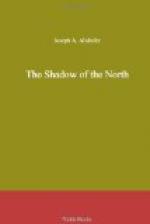“You have found the Mohawks a brave and loyal race,” said Robert, knowing the colonel was upon a favorite theme of his.
“That I have, Mr. Lennox. I came among them a boy. I was a trader then, and I settled first only a few miles from their largest town, Dyiondarogon. I tried to keep faith with them and as a result I found them always keeping faith with me. Then, when I went to Oghkwaga, I had the same experience. The Indians were defrauded in the fur trade by white swindlers, but dishonesty, besides being bad in itself, does not pay, Mr. Lennox. Bear that in mind. You may cheat for a while with success, but in time nobody will do business with you. Though you, I take it, will never be a merchant.”
“It is not because I frown upon the merchant’s calling, sir. I esteem it a high and noble one. But my mind does not turn to it.”
“So I gather from what I have seen of you, and from what Mr. Willet tells me. I’ve been hearing of your gift of oratory. You need not blush, my lad. If we have a gift we should accept it thankfully, and make the best use of it we can. You, I take it, will be a lawyer, then a public man, and you will sway the public mind. There should be grand occasions for such as you in a country like this, with its unlimited future.”
They came presently into a region of cultivation, fields which would be green with grain in the spring, showing here and there, and the smoke from the chimney of a stout log house rising now and then. Where a creek broke into a swift white fall stood a grist mill, and from a wood the sound of axes was heard.
Robert’s vivid imagination, which responded to all changes, kindled at once. He liked the wilderness, and it always made a great impression upon him, and he also took the keenest interest and delight in everything that civilization could offer. Now his spirit leaped up to meet what lay before him.
He found at Mount Johnson comfort and luxury that he had not expected, an abundance of all that the wilderness furnished, mingled with importations from Europe. He slept in a fine bed, he looked into more books, he saw on the walls reproductions of Titian and Watteau, and also pictures of race horses that had made themselves famous at Newmarket, he wrote letters to Albany on good paper, he could seal them with either black or red wax, and there were musical instruments upon one or two of which he could play.
Robert found all these things congenial. The luxury or what might have seemed luxury on the border, had in it nothing of decadence. There was an air of vigor, and Colonel Johnson, although he did not neglect his guests, plunged at once and deeply into business. A little village, dependent upon him and his affairs had grown up about him, and there were white men more or less in his service, some of whom he sent at once on missions for the war. Through it all his Indian wife glided quietly, but Robert saw that she was a wonderful help, managing with ease, and smoothing away many a difficulty.




